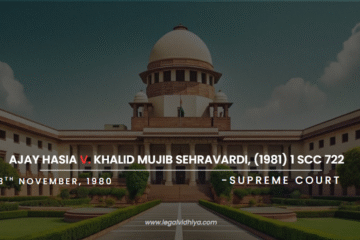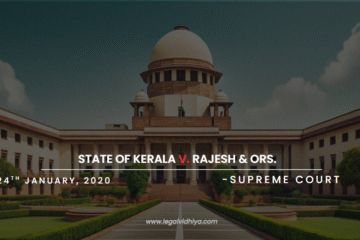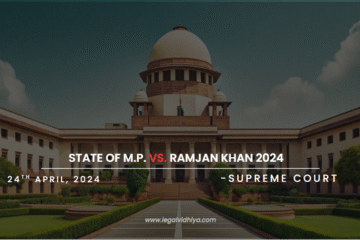
| CASE NAME : | SHIV SHANKAR SINGH VS STATE OF BIHAR |
| DATE OF JUDGEMENT : | 22 NOVEMBER 2011 |
| COURT : | SUPREME COURT OF INDIA |
| CASE NO. : | CRIMINAL APPEAL NO. 2160 0F 2011 |
| PETITIONER : | SHIV SHANKAR SINGH |
| RESPONDENT : | STATE OF BIHAR |
| BENCH : | B.S. CHAUHAN T.S. THAKUR |
FACTS OF THE CASE
. On December 6, 2004, a dacoity was committed in the house of Shiv Shankar Singh and his brother Kameshwar Singh. Gopal Singh, son of Kameshwar Singh, was killed during the dacoity and a number of valuables were looted.
. The police reached the scene of the crime two hours after the dacoity had taken place. An FIR was lodged by Shiv Shankar Singh naming Ramakant Singh and Anand Kumar Singh, along with 15 other persons, as the accused.
. The police investigated the matter and filed a final report under Section 173 of the Code of Criminal Procedure (CrPC) on April 9, 2005, stating that the case was false and that Gopal Singh had been killed due to a property dispute.
. Kameshwar Singh, the father of the deceased, filed a petition in the court challenging the final report filed by the police. The court did not pass any order on the petition.
. On August 29, 2005, the police filed a chargesheet against Shiv Shankar Singh, Bhola Singh, and others under Sections 302, 302/34, 506 of the Indian Penal Code (IPC).
. The case was tried before the Additional Sessions Judge, Patna, who convicted Shiv Shankar Singh and Bhola Singh under Sections 302 and 302/34 of the IPC and sentenced them to rigorous imprisonment for life.
. Shiv Shankar Singh and Bhola Singh appealed against their conviction to the Patna High Court. The High Court upheld their conviction and sentence.
. Shiv Shankar Singh and Bhola Singh then filed a special leave petition in the Supreme Court of India. The Supreme Court granted leave to appeal and set aside the judgement of the High Court.
RELEVANT SECTIONS
- SECTION 3O2 OF CRPC – Empowers a Magistrate inquiring into or trying a case to permit the prosecution to be conducted by any person other than a police officer below the rank of Inspector .
- SECTION 304 OF CRPC – Enables the SESSION COURTS to assign the pleader for the defence of the accused at the expense of the state provided he is unrepresented and the court is satisfied that he has no sufficient means to engage a pleader .
ISSUES RAISED
. Whether the prosecution had proved its case beyond reasonable doubt ?
. Whether the police had conducted a fair investigation ?
. Whether the trial court had properly appreciated the evidence ?
CONTENTION OF THE PETITIONER
. The contention of the petitioner in Shiv Shankar Singh vs State of Bihar was that the prosecution had failed to prove its case beyond reasonable doubt. The petitioner also contended that the police had not conducted a fair investigation and that the trial court had not properly appreciated the evidence.
The petitioner’s contentions were based on the following grounds:
- The prosecution had failed to produce any eyewitnesses to the dacoity or the murder.
- The prosecution had failed to produce any physical evidence linking the petitioner to the crime.
- The prosecution had relied on the testimony of a single witness, who was a close relative of the deceased.
- The trial court had not properly appreciated the evidence and had convicted the petitioner on the basis of circumstantial evidence.
CONTENTION OF RESPONDENT
. The contention of the respondent in Shiv Shankar Singh vs State of Bihar was that the prosecution had proved its case beyond reasonable doubt. The respondent also contended that the police had conducted a fair investigation and that the trial court had properly appreciated the evidence.
The respondent’s contentions were based on the following grounds:
- The prosecution had produced eyewitnesses to the dacoity and the murder.
- The prosecution had produced physical evidence linking the petitioner to the crime.
- The prosecution had not relied on the testimony of a single witness, but had relied on the testimony of multiple witnesses.
- The trial court had properly appreciated the evidence and had convicted the petitioner on the basis of both direct and circumstantial evidence.
JUDGEMENT
. The Court held that the prosecution had failed to prove its case beyond reasonable doubt. The Court observed that the prosecution had relied on the testimony of a single witness, who was a close relative of the deceased. The Court also observed that the prosecution had not produced any eyewitnesses to the dacoity or the murder.
. The Court held that the police had not conducted a fair investigation. The Court observed that the police had not recorded the statements of all the witnesses who were present at the scene of the crime. The Court also observed that the police had not collected any physical evidence linking the accused to the crime.
. The Court held that the trial court had not properly appreciated the evidence. The Court observed that the trial court had convicted the accused on the basis of circumstantial evidence. The Court held that the circumstantial evidence was not strong enough to prove the guilt of the accused beyond reasonable doubt.
The Supreme Court’s judgement in Shiv Shankar Singh vs State of Bihar is a landmark judgement in the field of criminal law. The judgement has set a precedent for future cases involving dacoity and murder.
The judgement has highlighted the importance of the following:
- The need for the prosecution to prove its case beyond reasonable doubt.
- The need for the police to conduct a fair investigation.
- The need for the trial court to properly appreciate the evidence.
CONCLUSION
The judgement is a reminder that the accused are presumed innocent until proven guilty. The prosecution must prove its case beyond reasonable doubt. The police must conduct a fair investigation and collect all the evidence. The trial court must properly appreciate the evidence and convict the accused only if the evidence is strong enough to prove their guilt beyond reasonable doubt.
The judgement is a victory for the rule of law. It is a reminder that the justice system must be fair and impartial. The accused must be given a fair trial and must not be convicted unless the evidence is strong enough to prove their guilt beyond reasonable doubt.
written by Aditya Singh intern under legal vidhiya




0 Comments